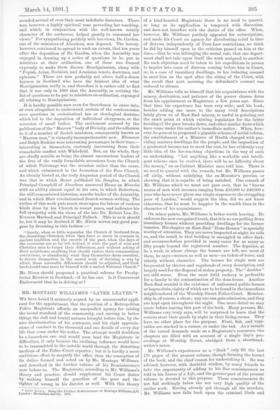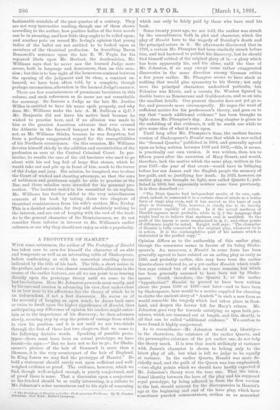MR. MONTAGU WILLIAMS'S "LATER LEAVES."* WE have heard it seriously
argued by an unsuccessful appli- cant for the appointment, that the position of a Metropolitan Police Magistrate affords an unequalled agency for raising the moral standard of the community, and moving to better things the dull and brutal natures brought before him, by the nice discrimination of his sentences, and his right apprecia- tions of conduct in the thousand and one details of every-day life that come under his notice. The attempt would doubtless be a hazardous one, and would soon land the Magistrate in difficulties, if only because the civilising influence would have to be transmitted to the outside world through the distorting medium of the Police-Court reporter ; but it is hardly a more ambitious effort to magnify the office, than the conception of its duties formed and acted on by Mr. Montagu Williams, and described in the further volume of his Reminiscences now before us. The Magistrate, according to Mr. Williams's theory and practice, should supplement his Court duties by making himself the guardian of the poor and the righter of wrong in iris district as well. With this theory
* Later pHci1n,, Being the Further Reminiscences of Montagu. Williams. Q.C. London : Macmillan and Co. MK.
of a kind-hearted Magistrate there is no need to quarrel, so long as its application is tempered with discretion, and does not interfere with the duties of the office. When, however, Mr. Williams publicly appealed for subscriptions, and made his Court an agency for distributing relief in time of distress independently of Poor-Law restrictions, we think he did lay himself open to the criticism passed on him at the time,—that he was infringing the sound rule, that one depart- ment shall not take upon itself the work assigned to another•. No such objection need be taken to his expeditions in person to inquire into cases of distress coming before him in Court, or, in a case of insanitary dwellings, to his inducing counsel to meet him on the spot after the rising of the Court, with the result that next morning the defendant's counsel was reduced to silence.
Mr. Williams tells us himself that his acquaintance with the misery, destitution, and patience of the poorer classes dates from his appointment as Magistrate a few years ago. Since that time his experience has been very wide ; and his book, besides adding one more to the many vivid descriptions lately given us of East-End misery, is useful in pointing out the exact point at which existing legislation for the better housing of the poor breaks down, and other similar facts which have come under the author's immediate notice. When, how- ever, he goes on to propound a gigantic scheme of social reform, the establishment of a Minister of Health charged with pro- viding sanitary dwellings for the people, and the imposition of a graduated income-tax to meet the cost, he has evidently very little idea of the far-reaching objections in the way of such an undertaking. " Let anything like a workable and intelli- gent scheme once be evolved, there will be no difficulty about the money," an ex-Cabinet Minister once told him. There is no need to quarrel with the remark, but Mr. Williams passes of airily, without satisfying the ex-Minister's proviso, or showing that it is capable of being satisfied. One remark of Mr. Williams which we must not pass over, that he "knows scores of men with incomes ranging from £10,000 to £40,000 a year who have never given one single sixpence to the struggling poor of London," would suggest the idea, did we not know otherwise, that he must be happier in the wealth than in the character of his acquaintance.
On minor points, Mr. Williams is better worth hearing. He enforces the now recognised truth, that it is no use pulling down insanitary houses without providing dwellings for the former• inmates. His chapter on East-End " Doss-Houses " is specially worthy of attention. They are never inspected at night, he tells us, and the result is that bedding is smuggled in after dark, and accommodation provided in many cases for as many as fifty people beyond the registered number. The deputies, at 6s. a week, in whose charge the houses are left, are most of them, he says—women as well as men—on ticket-of-leave, and utterly without character. The houses for single men are frequented by thieves and vagabonds of every description, and largely used for the disposal of stolen property. The " doubles " are still worse. Even the most fetid rookery is preferable for a family to the contamination of the doss-house. Another East-End scandal is the existence of unlicensed public-houses or bogus clubs, eighty of which are to be found in the immediate neighbourhood of the Worship Street Police-Court. Member- ship is, of course, a sham ; any one can gain admission, and they are kept open throughout the night. One more detail we may quote before leaving this part of the book. Many persons, Mr. Williams very truly says, will be surprised to learn that the costers store their goods by night in their living-rooms. They have no other place for the purpose. Fruit, fish, and vege- tables are stacked in a corner, or under the bed. As a sample of the varied demands made on a Magistrate's resources, two chapters are filled with an account of a single day's pro- ceedings at Worship Street, abridged from a shorthand- writer's notes.
Mr. Williams's experiences as a "Beak" only fill the last 170 pages of the present volume, though forming the kernel of the book, and the chief reason for undertaking it. Ho was advised, however, with doubtful wisdom, by many friends to take the opportunity of adding to his Bar reminiscences as told in his Leaves of a Life, and the greater part of the present volume is devoted to this purpose. These reminiscences do not fall strikingly below the not very high quality of the earlier work. Having already got through all his murders, Mr. Williams now falls back upon the criminal libels and fashionable scandals of the past quarter of a century. They are not very instructive reading, though one of them shows, according to the author, how positive ladies of the beau monde can be in swearing, and how little they ought to be relied upon; and another puts on record Mr. Irving's opinion that young ladies of the ballet are not entitled to be looked upon as members of the theatrical profession. In describing Baron Bramwell's sentence upon the late E. W. Pugin for his repeated libels upon Mr. Herbert, the Academician, Mr. Williams says that he never saw the learned Judge more severe, both in language and demeanour, than on this occa- sion ; but this is to lose sight of the humorous contrast between the opening of the judgment and its close, a contrast en- hanced, we have been often told, by a complete, though perhaps unconscious, alteration in the learned Judge's manner.
There are few reminiscences of prominent barristers in this volume, and such references as do occur are not remarkable for accuracy. So famous a Judge as the late Mr. Justice Wiles is entitled to have his name spelt properly, and why does Mr. Williams make the late A. M. Sullivan a Q.C. P Mr. Benjamin did not leave his native land because he wished to practise here, and if no allusion was made to him as the greatest American advocate that ever crossed the Atlantic in the farewell banquet to Mr. Phelps, it was not, as Mr. Williams thinks, because he was forgotten, but from a perhaps exaggerated regard for the susceptibilities of his Northern countrymen. On this occasion, Mr. Williams devotes himself chiefly to the oddities and eccentricities of the profession as seen at the Central Criminal Court. In par- ticular, he recalls the case of the old barrister who used to go about with his red bag full of large flint stones, which he would take out and pile up in front of him, much to the terror of the Judge and jury. His mission, he imagined, was to clear the Court of wicked and cheating attorneys, so that the sons of noblemen and gentlemen might be able to practise at the Bar, and these missiles were intended for his personal pro- tection. The incident ended in his committal to an asylum. Mr. Williams has further added to the very miscellaneous contents of his book by taking down two chapters of theatrical reminiscences from his wife's mother, Mrs. Keeley. This is a decided mistake, for they add absolutely nothing to the interest, and are out of keeping with the rest of the book. As to the general character of the Reminiscences, we do not consider them inferior in interest to Mr. Williams's earlier volumes, or see why they should not enjoy as wide a popularity.



































 Previous page
Previous page